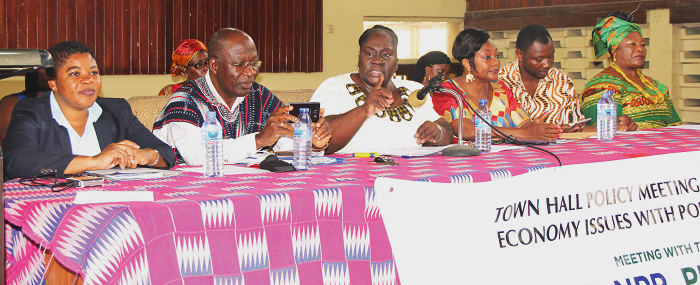Workers in the informal sector have asked the leadership of the various political parties to take the issue of urban poverty seriously and develop feasible and concrete policies to minimise the plight of the urban poor.
According to these workers, including hawkers, market women, and Kayayie, some of whom are homeless and slum dwellers, political parties had done little to address the enormous problems faced by the ever-increasing informal sector workers.
Addressing representatives of three political parties at a forum in Accra, the umbrella bodies of the informal sector workers accused political parties, particularly the National Democratic Congress (NDC) and the New Patriotic Party (NPP), of neglecting them during their term in office but only sought for their vote in election years.
The parties that attended the forum were the NDC, the NPP and the People’s National Convention (PNC).
Organised by People's Dialogue, a non-governmental organisation, the forum brought together the umbrella bodies of all the informal sector workers.
They were Ghana Federation of the Urban Poor (Ghafup), Greater Accra Markets Association (GAMA), Informal Hawkers and Vendor Association Ghana (IHVAG).
The purpose of the forum was for the informal sector workers to dialogue with political parties concerning issues affecting their businesses and well-being.
A research by the Ghana office of Freidrich Ebert Stiftung said 80 per cent of the Ghanaian workforce was employed in the informal sector.
The sector is characterised by underemployment, bad working conditions, uncertain work relationships and low wages.
Workers’ pain
Touching on the plights of slum dwellers and the homeless in the country, the President of Ghafup, Madam Janet Adu, said over the past years, political parties had not paid attention to issues that hampered the operations of the urban poor.
With a membership of about 17,000, she said, slum dwellers and the homeless were faced with numerous challenges that had shattered their hopes and aspirations.
According to Madam Adu, the NDC, after promising to address the land issue for slum dwellers in its 2012 manifesto, failed, adding: “Even though the NDC promised the development of a comprehensive land use policy, little impact was made between 2012 and 2016."
He said the living conditions of slum dwellers "is worsening, and Ghafup recommends that pragmatic steps be taken to restore hope to their constituents of more than 500,000 people".
On issues of hawkers and vendors, the National Coordinator of IHVAG, Ms Juliana Afari, said since street hawking and vending had become a part of life in Ghana, there was the need for political parties to come up with strategic actions on how to protect the women.
She particularly asked the government to establish clear channels that responded to the concerns and interest of the non-recognised markets, vendors and street hawkers.
Parties’ assurance
The three parties expressed their commitment and readiness to implement realistic policies on how to address urban poverty and minimise the plight of the urban poor.
Touching on how the NDC had helped improve the well-being of the informal sector workers, the Research Director of the NDC, Dr William Ahadzi, said the party had instituted many interventions to help address the problem of the urban poor.
He mentioned the construction of new markets and provision of soft loans for the informal sector workers.
Dr Ahadzi said the NDC would initiate a new programme aimed at building the skills of informal sector workers, adding that the umbrella bodies of the various groups of informal sector workers would be given the needed support to expand their operations.
Outlining some of the initiatives the NPP would introduce, the National Women’s Organiser of the party, Ms Otiko Djaba, said the NPP would ensure the equitable allocation of resources to the various groups of informal sector workers.
“We will also expand the Microfinance and Small Loan Centre (MASLOC) to cover more informal sector workers,” she added.
Ms Djaba also mentioned that the party intended to create a more conducive environment for all informal sector workers to undertake their businesses.
The National Chairman of the PNC, Mr Bernard Mornah, said the party would introduce a “night industry” and other trade concepts where all the various market centres in the country would be upgraded.
“Every region would be divided into a centre zone based on the population of the informal sector workers,” he added.
According to Mr Mornah, only the PNC government could address the problems affecting the informal sector workers.

